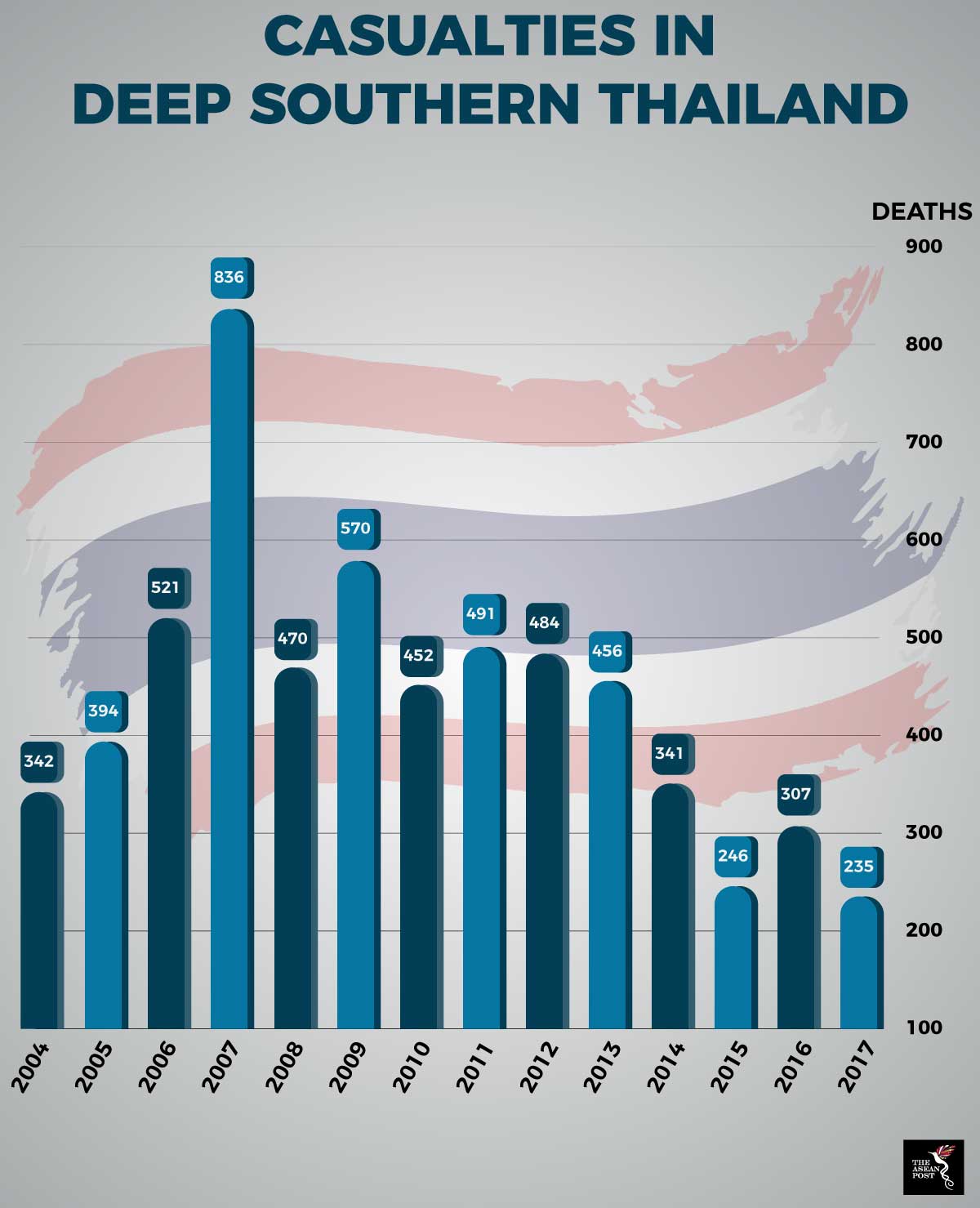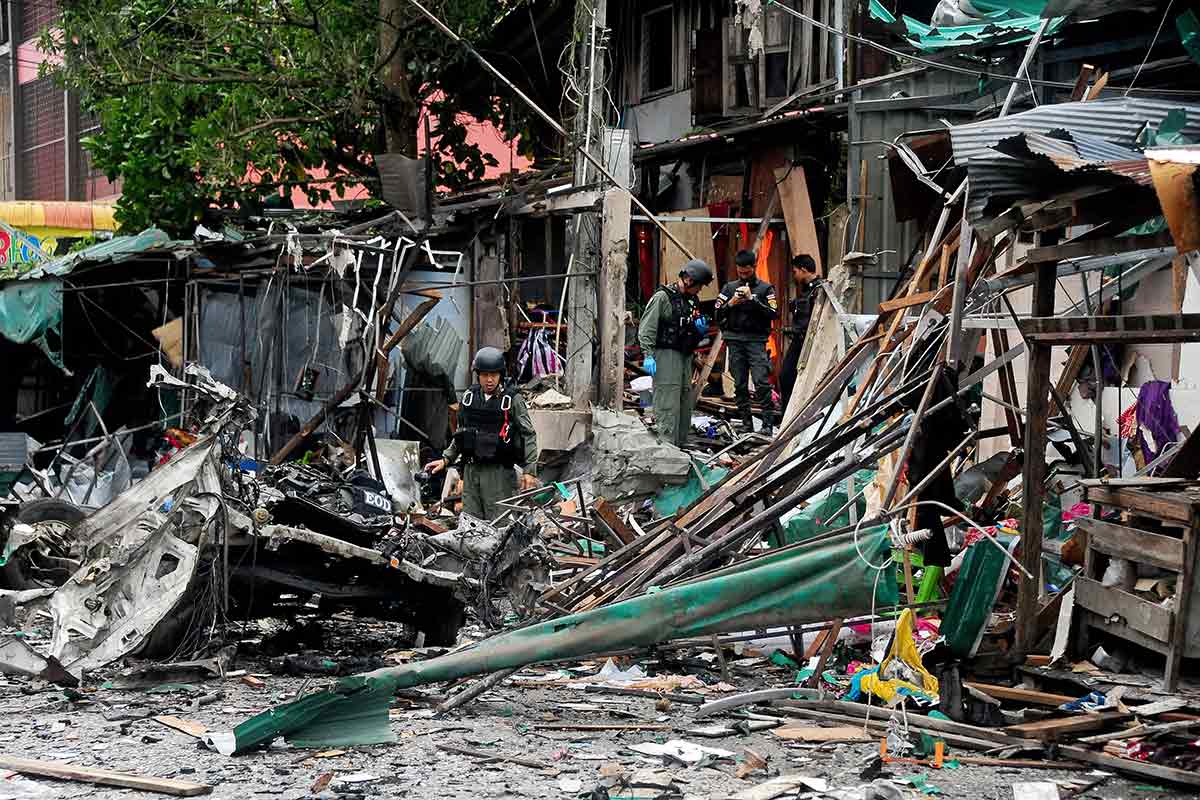On 14 August 2018, Pattani Islamic Mujahideen Movement deputy leader Nasori Saeseng surrendered at an army rangers’ unit in Kapor, Pattani. This, coupled with a record low number of deaths last year has risen hopes that the insurgency may be coming to a halt in favour of the government. Whether this marks the beginning of the end to the deep South Thailand insurgency conflict is yet to be seen.
Based on Deep South Watch’s statistics, the number of deaths related to the Southern Thailand-based insurgency between 2004 to 2017 was 6,145. This does not include two suspected rebel attacks in Narathiwat that killed one soldier and injured six others in June of last year. The number of deaths has since tapered off from 2014 onwards and would seem to coincide with the junta’s rise to power.
Following the military coup, the junta promised to end violence within a year. However, National War College professor Zachary Abuza claims that the decline in violence only afforded the military the luxury to draw out negotiations without making any concessions.
Abuza notes that by October 2015, the National Revolutionary Front (BRN) had quit the peace process, sensing the junta’s intransigence to make any concessions, including basic demands such as amnesties, prisoner releases, or linguistic reforms, let alone anything that threatened the unitary nature of the Thai state.
The BRN then issued a “rare” public statement in April 2017 rejecting the military’s peace plan and demanding that any peace process include the participation of third parties from the international community and an impartial mediator to conduct the talks. The junta, however, brushed this demand aside in an immediate response made by Prime Minister Prayut Chan-o-cha and lead negotiator General Aksara Kerdphol.
“We are not paying much attention to that statement and we insist on continuing with the peace talks and we believe this format is good enough. Malaysia only serves as the facilitator of the talks, not the mediator. There is no need to have any international observer in the talks. Don’t pay much attention to such separatist announcements. Separation is impossible. Who would ever agree with the separation idea? No one in the southern border area does,” their statement read.
The Thai government continues to deny that the rebels have legitimate grievances, adding that Thailand’s fourth army chief, Lieutenant General Piyawat Nakwanich, asserted ‘economic interests’ and not separatism behind the motive for the Big C attack – referring to the 9 May bombings at a large shopping mall in Bangkok.
“Other military officials continue to push the unfounded line about the insurgency being about illegal drugs. The Thai government denies the Pattani people their identity and just cannot fathom why the Pattani Malay continue to resist assimilation,” Abuza said.
What the junta is doing right
The junta has been doing some things right, at least if you go by what Australia National University’s Southeast Asia Institute director John Blaxland says. According to Blaxland, the drop in the number of casualties can be explained in part by what the Thai military has done to raise levels of professionalism within its ranks. He said these changes have led to a marked reduction in accusations of human rights abuses.

Source: Deep South Watch
“Sources indicate that while the government remains determined not to cave in on the issue of separate governance, some concessions have been made to accommodate local mores on language and Islamic dress for instance. These appear to be having some positive effect,” he said.
In 2017, however, a member of the BRN told the media that the drop in casualties was simply due to the group’s inability to create violence.
“The military is everywhere, in the villages and so on. But there are orders to carry out attacks, and sometimes we failed,” the rebel said, speaking on condition of anonymity.
Violence far from over
While the number of deaths has been at an all-time low compared to previous years, the violence is still far from over. Speaking to The ASEAN Post, JK Associates principal consultant and security expert Khen Han Ming said that the Thai government should remain cautiously optimistic.
“While the situation seems to be improving, as long as there are casualties there are still some steps that the government can take to further improve the situation,” he said.
Softening their approach, continuing to empower the community, recognising cultural differences and building the economy and creating jobs were some of the moves Khen believes would bring the insurgency to an end.
Related articles:
Four killed by bomb in rebel-hit Southern Thailand
